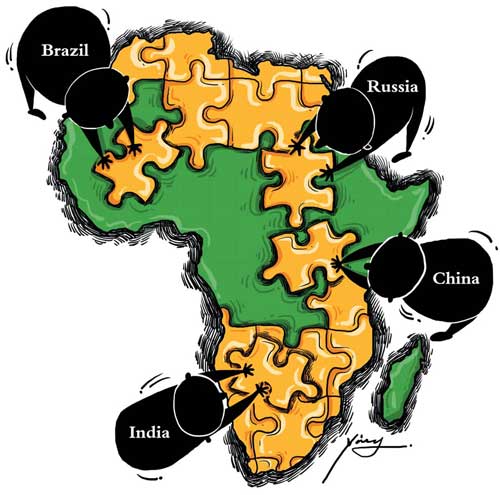
The 5th BRICS Summit in Durban, to be held on March 26 and 27, will focus on what the illustrious emerging powers club considers to be today’s most exciting phenomenon in international affairs: The rise of Africa. Brazil, India, Russia and China are rapidly increasing their presence in Africa, fundamentally altering the power dynamics on a continent that was once little more than a recipient of Western aid. BRICS-Africa trade is set to increase threefold, from $150-billion in 2010 to $530-billion in 2015. In 2010, China overtook the United States as Africa’s largest trading partner, while Brazil and India currently rank as Africa’s sixth and 10th largest trading partners, respectively. “BRICS and Africa – partnerships for integration and industrialisation” will be the theme of the 5th BRICS Summit. One key issue will stand out at the summit: the promotion of African infrastructure development through the establishment of a BRICS-led development bank.
The South African government will do whatever it can to present itself as a country capable of representing not only its own national interests, but also those of the entire continent. As Jim O’Neill recently argued, “South Africa could more than justify its presence if it helped Africa to fulfill its remarkable potential.” Yet at the same time, South African policy makers surely worry that if other nations such as Nigeria, Egypt, Ethiopia and Kenya reach South African GDP per capita levels, South Africa will no longer be able to claim a leadership position on the continent.
Putting such worries aside, the South African government has invited the African Union (AU) and African regional economies to participate in the talks – indeed a smart move considering that Nigeria has long dreamed of being part of the club.
The big question, however, how today’s emerging powers are able to support Africa’s economic rise. It seems clear that emerging powers greatly benefit from their economic ties with African nations – since China took the lead, India’s presence has grown considerably. Brazil is seeking to establish stronger ties with non-Portuguese speaking African countries, and even Russia is keen on gaining greater visibility in Africa. Yet relations between Africa and emerging countries are far from problem-free. China’s reputation has suffered in several African countries (Thabo Mbeki, the former South African president, described China’s search for natural resources in Africa as a “new form of neo-colonialist adventure”), and both India and Brazil are increasingly aware that they, too, could soon be seen as the new colonizers in Africa.
The BRICS Development Bank seems to be an ideal instrument to show African leaders and citizens that the BRICS seek to engage with Africa on a long-term basis, and not merely exploit the continent’s natural resources. Yet even if the Bank will be created at the 5th BRICS Summit in Durban, there is no guarantee that it will begin operating anytime soon. Important questions regarding the location of headquarters, the administrative structure, lending practices, conditionalities and the leadership of the Bank, remain to be answered. Brazilian, Chinese, Indian, Russian and Chinese policy makers are in for a formidable round of negotiations in what will be the first real test of whether the BRICS can cooperate.
Read also:
Is there potential for a BRICS security architecture?
Why the BRICS should forget Jim O’Neill








